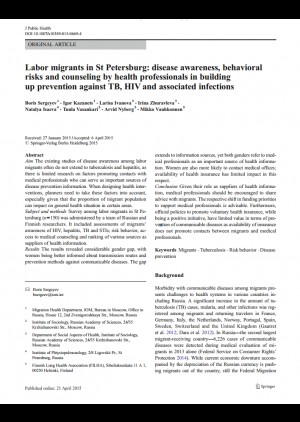While there is a number of studies on prevalence of risk behaviors with respect to communicable diseases among labor migrants in Russia, practically no systematic research linking together their socio-economic background, life circumstances, awareness levels and information sources on communicable diseases has been conducted. At the same time in designing disease prevention campaigns, program planners need to take these factors into account. Responding to these demands, survey among labor migrants in St Petersburg (n=150), both men and women, was administered by a team of Russian and Finnish researchers. It included assessments of migrants’ awareness of HIV, hepatitis TB and STIs; involvement in risk behavior such as sexual contacts, alcohol and drug consumption; and asked to rank various sources in terms of their importance as suppliers of information on communicable diseases. The results revealed considerable gender gap, with women being better informed about transmission routes and prevention methods against infectious diseases. Gender gap extends to information sources on TB and other communicable diseases. For men they include TV, educational institutions, friends medical professionals, and parents while women rely on parents, TV, friends, educational institutions and medical professionals. Given their role as suppliers of health information for migrants, medical professionals should be encouraged to share health advice with migrants as existing opportunities remain underutilized. The respective shift in funding priorities to support medical professionals delivering health information to migrants is also advisable.

Labor migrants in St Petersburg: disease awareness, behavioral
Author/s: Boris Sergeyev, Igor Kazanets, Larisa Ivanova, Irina Zhuravleva, Natalya Isaeva, Tuula Vasankari, Arvid Nyberg, Mikko Vauhkonnen
Year:
Language: English
Publication Type: Scientific Report (Journal)(External)
Download this Publication
Year:
Language: English
Publication Type: Scientific Report (Journal)(External)
Download this Publication
Description
Region/Country (by coverage)
Publisher
Springer-Verlag Berlin Heidelberg
Project Type